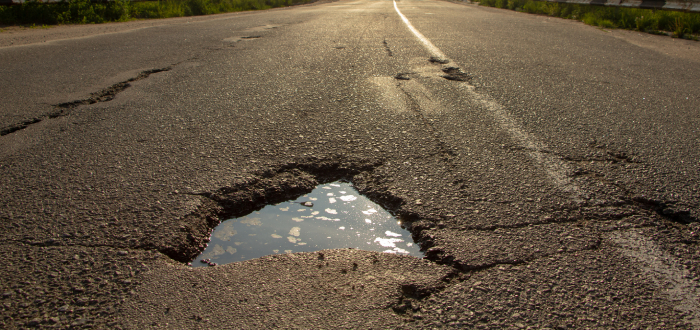Road defects significantly contribute to traffic accidents in Georgia, posing a serious risk to road safety. Poor road conditions can lead to a loss of vehicle control and increase the likelihood of collisions. Additionally, inadequate road maintenance and design flaws can create hazardous driving conditions. These defects not only directly cause accidents but also indirectly contribute to them by forcing drivers to take sudden actions to avoid obstacles or defects in the road. These defects can be intensified by weather conditions like rain, snow, or ice, which are common in certain parts of Georgia.
Typical Road Defects That Contribute to Accidents
- Potholes: These are caused by the expansion and contraction of water after it has seeped into the ground under the pavement. When vehicles drive over these areas, the weight can cause the material to collapse and form a pothole. Hitting a pothole can cause a driver to lose control, leading to accidents.
- Uneven Road Surfaces: This can result from inadequate road maintenance, weather-related wear and tear, or construction work. Uneven surfaces can affect a vehicle’s stability and steering, increasing the risk of accidents.
- Lack of Proper Signage: Missing or unclear road signs can lead to confusion among drivers, increasing the risk of collisions. This includes missing signs for sharp turns, speed limits, and other traffic regulations.
- Faulty Traffic Lights and Inadequate Street Lighting: Malfunctioning traffic lights can create confusion at intersections, which is one of the most common places where automobile accidents occur. In addition, inadequate lighting can make it difficult for drivers to see the road ahead, pedestrians, or other hazards, especially at night.
- Poorly Marked or Faded Road Lines: When lane lines are not clearly visible, it can lead to lane departure accidents and confusion about the right of way.
- Drainage Issues: Poor drainage can lead to water accumulation on roads, creating slippery surfaces and increasing the risk of hydroplaning.
- Bridge Defects: Issues like structural weaknesses or damage in bridges can be particularly dangerous, leading to serious accidents involving multiple vehicles.
- Construction Zone Negligence: Inadequately marked or poorly managed construction zones can create hazardous driving conditions.
- Road Debris: Objects on the road, such as items that fall off of vehicles, can cause drivers to swerve unexpectedly or lose control.
Legal Causes of Action That Arise from Accidents as a Result of Road Defects
Several legal causes of action can arise from accidents caused by poor road conditions. Some of the common ones are:
- Negligence: This is the most common legal theory under which road accident claims are made. To prove negligence, it must be shown that the entity had a duty to maintain the road, breached that duty and this breach directly caused the accident and resulting damages. A party (possibly a government entity responsible for road maintenance) may be found negligent if they fail to maintain the road in a reasonably safe condition.
- Premises Liability: This cause of action applies when an accident is caused by a hazardous condition on a property, including public roads. The entity responsible for the road can be held liable if it knew or should have known about the dangerous condition and failed to correct it or warn the public.
- Nuisance: A public nuisance claim might apply if the poor road condition endangers the public’s health, safety, or welfare. For example, a consistently flooded roadway might be considered a nuisance.
- Governmental Liability: Special rules apply when suing a government entity in Georgia. The Georgia Tort Claims Act (GTCA) governs tort claims against state entities. It provides for the waiver of certain immunities in tort cases, as well as limitations on liability for state government entities. Local governments may have different rules. These claims often involve demonstrating that the government had actual or constructive notice of the dangerous condition. The GTCA also includes requirements and procedures for claims before they go forward, including a requirement that the party planning to file a civil lawsuit must put the government on notice of their intent to sue that particular entity (known as an ante litem notice). Lastly, there are monetary caps placed on the liability when a governmental entity is sued in Georgia (O.C.G.A. § 50-21-29).
- Product Liability: In some cases, the cause of an accident may be related to faulty road construction materials or design. In these situations, a product liability claim can be brought against the manufacturer or designer due to faulty materials or road design.
- Contractual Claims: If the road condition issue arose from a breach of contract (such as a contractor failing to fulfill the terms of a road construction contract), this could give rise to a contractual claim.
It is important to consult with a personal injury or civil litigation attorney who is experienced in this area of the law to understand the nuances of your situation and the applicable laws in Georgia. Gautreaux Law is a personal injury law firm with highly skilled attorneys serving Macon, Warner Robins, and all of Georgia. We can help you navigate the specific circumstances of your case. Contact our firm for an initial complimentary consultation to see how we can design an effective legal strategy for you.



